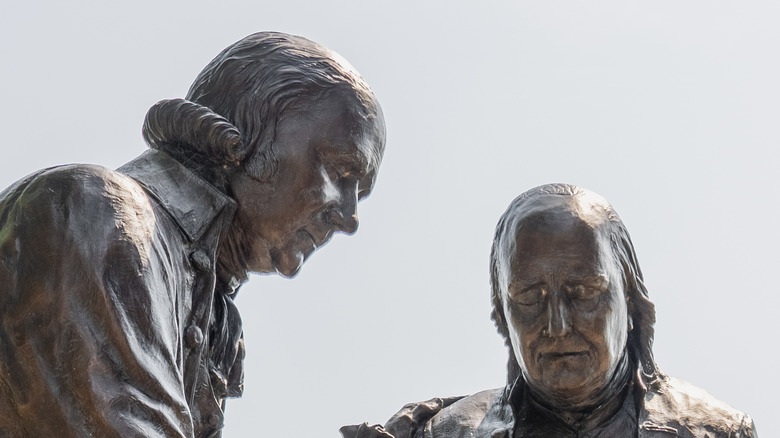The Reason Why John Adams And Ben Franklin Once Shared A Bed
Benjamin Franklin and John Adams are among the most well-known figures in American politics. Of the country's founding fathers, they were perhaps the most critical, as they helped secure French military aid for the American war effort. And the two stood out in many ways from their contemporaries — Franklin was a womanizing man of health and science, while Adams held the belief that the executive branch of the republic should affect the styling of a monarchy in its relationship with the others (via Politico).
On a moral basis, the two were also unique in their respective stances against slavery, although Franklin did own slaves in his youth, and it was not until his later years that he opposed the practice (via National Archives). In 1776, these two historic figures were traveling to meet with British Admiral Richard Howe and negotiate possible peace terms. One night, they stopped to rest, and in what seems like the set-up to a scene in a parody film, the two were forced to share a bed as the inn was otherwise out of space (via Mental Floss).
Two of America's greatest statesmen argued about a window while in bed
Sharing a bed was hardly a point of contention between John Adams and Benjamin Franklin by itself. Tempers only began to flare between them when Adams, concerned that the cold air might induce illness in him, shut the room's only window (via Entrepreneur). Per Adams' own account of that night, Franklin decried the closing. In his view, the circulation of outside air had a positive effect on personal health, while close and confined proximity to people led to sickness (via New England Historical Society).
The latter's theory and the former's personal experiences were thrown back at each other for some time until a curious Adams ultimately relented and opened the window (via History101). Adams states that he proceeded to fall asleep listening to Franklin philosophize, and the next day they set off again. Their meeting with Howe was fruitless, and the war carried on until its definitive end in 1783. However, Adams did not fall ill, thus validating Franklin's postulations and giving him some semblance of accomplishment out of the whole affair.

